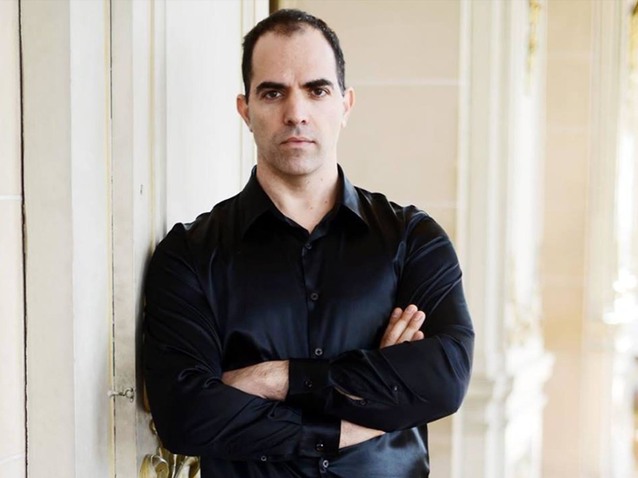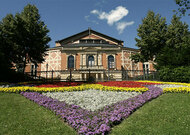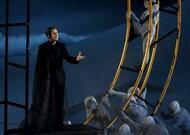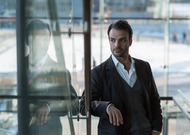 © Christophe Courtois
© Christophe Courtois
Rani Calderon is known to us from his work as music director of the Opéra national de Lorraine as well as for his interpretations as a conductor, which we have often reviewed and praised. Few know however that today he is dedicating his time to a new activity: composition. While the prelude of his opera, based on Victor Hugo’s novel “Notre Dame de Paris” (“The Hunchback of Notre Dame”), which he builds in the manner of the gothic cathedrals, was recently premiered at the Colmar Festival under his direction, the conductor, librettist and composer agreed to discuss with us not only his own work, but the entire matter of opera composition in our days…
***
How does one write an opera today? What are the differences, if there are any, between the process of composition today and that of composers in the past?
There are two different courses of action possible, both having a precedent in the past, the first consisting of a commission made by the theater: the opera house gets in touch with a composer and a common project is agreed on. In this case the theater usually takes part in the process of creation, especially as far as the dramaturgy is concerned. The other option comes directly from a composer who has a an idea of his own, as in my case.
Could you explain us your artistic approach? Why do you wish to write this opera?
Personally, what I would like to do with Notre Dame de Paris, is to write a work which would set itself in the operatic tradition of the past. As a conductor, musician and music lover, I appreciate very much the varied repertoire written in the twentieth and twenty-first centuries, which includes magnificent, beautiful and interesting works. Nevertheless I would also like to see a continuation of the opera tradition of the past – I am referring to what started with Gluck and ended with Puccini’s Turandot. The choice of subject is crucial here: the operatic machine and the mechanisms of the style I am talking about are capable of expressing a certain type of subjects. Then there is of course my personal sensibility and I am writing this opera because I would like to see Notre Dame de Paris in theater and music. Opera is above all dramaturgy, and Hugo is probably one of the greatest dramaturgs, even when he writes a novel. It is true that the characters of Notre Dame de Paris themselves are very famous, but the elaborated story of the novel, with all its perhaps less known details, contains social criticism and other messages still valid today, which could find their perfect expression, in my opinion, in a big operatic work.
When we first contacted you, you drew a parallel between the construction of a cathedral and the composition of an opera…
Indeed. After a year and a half’s work on the opera, last April, there was the terrible fire at the cathedral, which affected me deeply. This event left its mark on me and inspired me to explore the world of architecture of gothic cathedrals. I then realized there were many similarities between the construction of a cathedral and an opera. It is something both monumental and full of tiny details. One should be able to work on both levels: on one hand, a gigantic architecture, at the limit of our capacity of perception, and on the other, an infinite number of minuscule details, as for instance the differences in the libretto between two possible prepositions, or the precise choice of an instrument in the orchestra for a given moment. Another common feature is that my opera has three acts, just as the cathedral has three major parts (the choir, the transept and the nave). One could even point out a similarity in the process itself of the composition of this opera and the building of a cathedral, since after having composed the opening prelude and the first introduction scene, I went to write the very end of the piece and then worked back towards the beginning. This resembles what used to be the practice with the cathedrals, where the choir was built first – for practical reasons – following a “progression backwards” towards the facade.
You have already described some of it, but could you tell us more about your opera which is almost finished?
I believe that for this type of subject and the type of opera which interests me, the best model remains Verdi. The work is organized in three acts: there is a prelude, presenting the principal themes, as well as an epilogue – which is less common for this type of opera, but corresponds to the structure of the novel. I did in fact try to stay as loyal as possible to the book, within the limits of the operatic form, especially as far as the ending is concerned, which I find perfect for an opera as I imagine it. I would even dare say that some moments of the novel are realized more effectively in the opera, as for instance the recognition moment between Esmeralda and the Sachette, where Hugo writes: “Here we give up any description.” Music is capable of doing it! The subject of Notre Dame de Paris is full of colors and fantasy with its gothic, Romanesque flavour, its passionate characters like Claude Frollo, who is full of contradictions, or Quasimodo, for whom we have the luck of having Rigoletto as a reference (obviously keeping in mind all the evident differences between the two characters). Indeed, an important parallel between the two operas is the idea of the curse and the destiny (Hugo uses the Greek word Anankè, Ἀνάγκη): in both works (as in their literary counterparts) a curse, pronounced at the beginning of the piece, brings it to a tragic end. A last element to which I gave much importance is the mixture between comic and tragic, which one finds both in Verdi and Hugo.
Regarding the form, there has been in the last century some kind of a total rejection of everything that had been done before. Today, even though I fully comprehend the motivations of those years and I do respect them, it seems to me that one could go back to the classical forms with a “fresh”, up-to-date look, in order to rediscover not only their beauty, but also their inner significance and dramatic efficiency. It would be interesting to take the classical elements and infuse them with something new, to go and look for the wisdom – as has been always done in the past – in the “ancient style”, which to me and for the type of opera in question, is represented by Verdi. Therefore, what I am trying to do here, is to use the forms, the conventions, the gestures, the codes and of course the melodic language of the traditional style, without depriving myself of any of the more advanced means, when they are needed, in order to recount this story, which is a universal one. I believe in tonality and in form, and the most interesting thing for me is to write inside the conventions without being conventional.
You spoke to us about the subject of your opera, which is Notre Dame de Paris. What brought you to this choice?
I read the book in 2016, if I remember correctly. This was part of the extensive reading of French literature which I undertook, having been nominated music director of the Opéra national de Lorraine. Since it was an important public post, I thought it was an occasion for me to deepen my knowledge of the French language, culture and history. I therefore started reading extensively, among others Notre Dame de Paris, which made a special impression on me because of its theatrical writing. While reading it, one often has the impression of attending a show: the theater is present from the very beginning and many chapters are written more like scenes in a play than in a novel. An extraordinary example of this writing is the tragic end of Esmeralda and Frollo: the image of these two characters hanging - one on the gallows, the other from the cathedral - on both sides of the Seine, and their simultaneous death: that is real theater!
Apart of the composition, you also wrote the libretto. The adaptation of Hugo’s work has probably not been an easy task, has it?
I will not hide the fact that in the beginning I was not completely sure whether I wanted to write it alone. I did try to collaborate with several extremely talented people, but I finally realized that if I wanted to do the opera the way I imagined it, it was better for me to write it myself. The libretto of an opera is today a genre which is a bit lost and often, alas, considered as poor and even ridiculous, whereas it is impossible to judge a libretto without considering it with the music it was written for. It would be just as senseless as judging the taste of a cake by eating the flour it contains. When one writes a libretto, one must consider the voice, the specific codes of opera and its special language. I therefore immersed myself once more, in an even more profound way and with a different perspective, in the reading of French literature, poetry and theater, and I write the libretto and the music together.
Now that the opera is practically finished arrives the moment where it should be brought to stage. Is it difficult to have new pieces programmed when they are not commissioned, especially as opposed to the “classical” repertoire, already well known to the public?
I think there is a problem we need to fight today, but which is already going through a positive change: during decades the public suffered from an elitist attitude on the part of both artists and theaters. One virtually stopped considering it, treating it as ignorant and incapable of understanding the highly sophisticated and savant works of contemporary artists. Personally I do not identify with this approach: if I create a work, it comes of course out of a necessity, an inner drive, but also because there is something I want to share with the community, in the broad sense of the term. I perceived in Notre Dame de Paris extremely important messages, like the criticism of social hypocrisy, the rejection of the foreigner and the different, or the abuse of power for the pursuit of personal goals. These are classical themes which will always remain valid, and if I decided to make an opera of the novel, it was also in order to honor it and present its messages to a new public.
Furthermore, today we have new means for presenting our works to the public, notably recordings and the internet. One may prepare the ground for a premiere of an opera in a new way. If we go back to the idea of the cathedrals, which we spoke of at the beginning: we are dealing with something so vast, with such an enormous quantity of details that we cannot possibly pretend visiting a cathedral or listening to an opera just once and fully understand their content. A recording could be an important and efficient help in this sense.
You just spoke about the future you wish for your opera, but what future do you see for new operas in general today?
One very positive thing which we can see, especially in the United States, is the emerging of a new attention to the public’s needs, and a more accessible way of writing. To write something beautiful and comprehensible is not a shame, nor a sign of banality, lack of talent or weakness. To find one’s path in a long tradition set by geniuses whose talent has been confirmed thousands of times, to be a newcomer and do something which does have weight and significance – is not an easy task. And yet one should have the courage to do it. I hope and believe that the world will go in this direction. I think that even if we are right now in a difficult period, socially and artistically, the wheel will turn, and I hope to participate in this movement with Notre Dame de Paris and other operas which I have already in mind…
Interview made in french by Elodie Martinez, on August 6th 2019
© Christophe Courtois
the 27 of August, 2019 | Print



Comments